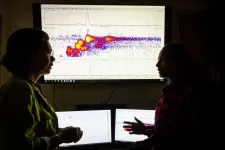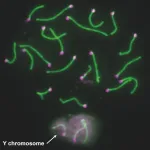(Press-News.org) A new statistical tool that combines multiple clinical and pathologic factors with a patient's 21-gene Oncotype DX Breast Recurrence Score® result provides more accurate estimates about that patient’s breast cancer prognosis and their potential benefit from chemotherapy than either the Recurrence Score® result or clinical factors alone.
The tool could be used in counseling patients with hormone receptor-positive (HR+), HER2-negative breast cancer that has spread to the lymph nodes, and could improve shared decision-making about treatment. The work, published in the Journal of Clinical Oncology (https://doi.org/10.1200/JCO-24-01507), was carried out by a team from the SWOG Cancer Research Network, a clinical trials group funded by the National Cancer Institute (NCI), part of the National Institutes of Health (NIH).
“Joint patient–physician decision making about administering adjuvant chemotherapy requires individualized predictions of absolute prognostic risk and absolute chemotherapy benefit,” said lead author Lajos Pusztai, MD, DPhil.
“Aggregate clinical trial results inform about overall benefit seen in the entire study population (e.g., the improvement in median disease-free survival), but these metrics do not accurately reflect patient-level prognosis and treatment benefit. Our goal was to develop a patient-level prognostic and chemotherapy benefit predictor.”
Dr. Pusztai is professor of medicine at Yale Cancer Center and is chair of SWOG’s breast cancer research committee.
The new tool is known as RSClin Tool N+, and the underlying model was developed using data from more than 5,000 patients, including both premenopausal and postmenopausal women, on two large breast cancer trials led by SWOG within the NCI’s National Clinical Trials Network – the S8814 trial and the S1007 RxPONDER trial.
RSClin Tool N+ incorporates data on Recurrence Score result, tumor size, histologic grade, the number of involved lymph nodes, and the patient’s age into a multivariate statistical model. The tool can be used to provide improved estimates of recurrence risk for a patient treated with endocrine therapy alone, along with an estimate of how much this risk would decrease if that patient also underwent chemotherapy.
A personalized risk reduction estimate of this sort can help a patient come to an informed decision with their physician as to whether to add chemotherapy to their standard endocrine therapy.
To assess how accurately RSClin Tool N+ risk estimates match actual patient outcomes, the researchers validated the model against data from the Clalit Health Services registry on 573 patients with node-positive breast cancer. A high level of concordance between risk predictions and observed outcomes confirmed the model’s validity.
The tool complements the earlier RSClin® Tool N0, which provides similar prognostic information for patients with HR+, HER2-negative breast cancer that is lymph node negative (that is, the disease has not spread to the lymph nodes).
RSClin Tool N+ is now available to physicians in the United States, Canada, and Israel via the Exact Sciences website (portal.exactsciences.com).
This work was supported by NCI/NIH grants U10CA180888, U10CA180819, and U24CA196175 to the SWOG Cancer Research Network, and in part by Exact Sciences Corporation (through its wholly owned subsidiary Genomic Health, Inc.) and The Hope Foundation for Cancer Research.
In addition to Dr. Pusztai, authors include Jess R. Hoag, PhD, Exact Sciences Corporation; Kathy S. Albain, MD, Loyola University Chicago Stritch School of Medicine; William E. Barlow, PhD, SWOG Statistics and Data Management Center and Fred Hutch Cancer Center; Salomon M. Stemmer, MD, Tel Aviv University and Rabin Medical Center, Israel; Allison Meisner, PhD, Fred Hutch Cancer Center; Gabriel N. Hortobagyi, MD, University of Texas MD Anderson Cancer Center; Steven Shak, MD, Exact Sciences Corporation; James M. Rae, PhD, University of Michigan; Rick Baehner, MD, Exact Sciences Corporation; Priyanka Sharma, MD, University of Kansas Medical Center; and Kevin M. Kalinsky, MD, PhD, Emory University School of Medicine.
SWOG Cancer Research Network is part of the National Cancer Institute's National Clinical Trials Network and the NCI Community Oncology Research Program and is part of the oldest and largest publicly funded cancer research network in the nation. SWOG has 20,000 members in 45 states and eight other countries who design and conduct clinical trials to improve the lives of people with cancer. SWOG trials have directly led to FDA approval of 14 cancer drugs, changed more than 100 standards of cancer care, and saved more than 3 million years of human life. Learn more at swog.org, and follow us on Twitter/X at @SWOG.
Reference:
“Development and Validation of the RSClinN+ Tool to Predict Prognosis and Chemotherapy Benefit for Hormone Receptor–Positive, Node-Positive Breast Cancer.” J Clin Oncol, published online Dec. 2, 2024. https://doi.org/10.1200/JCO-24-01507
NOTE: Oncotype, Oncotype DX Breast Recurrence Score, Breast Recurrence Score, and Recurrence Score are registered trademarks of Genomic Health, Inc., a wholly owned subsidiary of Exact Sciences. Exact Sciences is a registered trademark of Exact Sciences Corporation.
END
RSClin® Tool N+ gives more accurate estimates of recurrence risk and individual chemotherapy benefit in node-positive breast cancer
Statistical tool combines clinical and pathologic factors with the 21-gene Oncotype DX Breast Recurrence Score® to provide more accurate estimates about breast cancer prognosis and potential chemo benefit than individual factors alone can.
2025-01-23
ELSE PRESS RELEASES FROM THIS DATE:
Terahertz pulses induce chirality in a non-chiral crystal
2025-01-23
Chirality refers to objects that cannot be superimposed to their mirror images through any combination of rotations or translations, much like the distinct left and right hands of a human. In chiral crystals, the spatial arrangement of atoms confers a specific "handedness", which, for example, influences their optical and electrical properties.
The Hamburg-Oxford team focused on so-called antiferro-chirals, a type of non-chiral crystals reminiscent of antiferro-magnetic materials, in which magnetic ...
AI judged to be more compassionate than expert crisis responders: Study
2025-01-23
By definition, robots can’t feel empathy — it requires being able to relate to another person’s human experience, to put yourself in their shoes.
But according to new U of T Scarborough research, artificial intelligence (AI) can create empathetic responses more reliably and consistently than humans, even when compared to professionals whose job relies on empathizing with those in need.
“AI doesn’t get tired,” says Dariya Ovsyannikova (HBSc 2023 UTSC), lab manager in Professor Michael Inzlicht’s lab at U of T Scarborough ...
Scale-up fabrication of perovskite quantum dots
2025-01-23
Quantum dots are tiny semiconductor nano materials with color-tunable and high-efficiency photoluminescence, which have been successfully applied in different display technology such as liquid crystal displays (LCDs), organic light-emitting diodes (OLEDs), and micro light-emitting diodes (Micro-LEDs). In 2023, the Nobel Prize in Chemistry rewards the discovery and development of quantum dots. Perovskite quantum dots (PQDs) are emerging display materials with high absorption coefficient, low cost and easy processability, and less environmental impact. ...
Adverse childhood experiences influence potentially dangerous firearm-related behavior in adulthood
2025-01-23
Researchers at Rutgers University have found that adverse childhood experiences can make people more sensitive to potential threats from others, which in turn increases their risk of engaging in defensive gun use in adulthood.
Their study, published in the Journal of Psychiatric Research, used cross-sectional data from a subsample of 3,130 adults with firearm access drawn from a nationally representative sample of U.S. adults.
Those surveyed were asked about their childhood experiences with abuse and neglect, their levels of social distrust and sensitivity to perceived threats, depressive symptoms and their self-reported use of a gun for self-defense.
The authors first assessed the association ...
Bacteria found to eat forever chemicals — and even some of their toxic byproducts
2025-01-23
BUFFALO, N.Y. — In the quest to take the “forever” out of “forever chemicals,” bacteria might be our ally.
Most remediation of per- and polyfluoroalkyl substances (PFAS) involves adsorbing and trapping them, but certain microbes can actually break apart the strong chemical bonds that allow these chemicals to persist for so long in the environment.
Now, a University at Buffalo-led team has identified a strain of bacteria that can break down and transform at least three types of PFAS, and, perhaps even more crucially, some of ...
London cabbies’ planning strategies could help inform future of AI
2025-01-23
Researchers have measured the thinking time of London taxi drivers - famous for their knowledge of more than 26,000 streets across the city - as part of a study into the future of AI route-mapping.
Unlike a satnav, which calculates every possible route until it gets to the destination, researchers at the University of York, in collaboration with University College London and the Champalimaud Foundation, found that London taxi drivers rationally plan each route by prioritising the most challenging areas first and filling in the rest of the route around these tricky points.
Current computational models to understand ...
More acidic oceans may affect the sex of oysters
2025-01-23
Rising carbon dioxide levels affect more than just the climate; they also affect the chemistry of the oceans. When saltwater absorbs carbon dioxide, it becomes acidic, which alters the aquatic animal ecosystem. But how exactly does ocean acidification impact animals whose genetic makeup can shift depending on environmental cues? A study published in ACS’ Environmental Science & Technology addresses this question through the “eyes” of oysters.
Oysters, unlike mammals and birds, do not have chromosomes that dictate their sex at the ...
Transportation insecurity in Detroit and beyond
2025-01-23
Images
More than a third of Detroit residents (36%) can't get from place to place in a safe or timely manner.
This is the main finding of a new study led by Alexandra Murphy, associate director of social science research at Mcity and assistant research scientist at U-M's Poverty Solutions, and first author Lydia Wileden, a U-M alum and assistant research professor at the University of Connecticut.
They measured this with a tool created by Murphy and her team called the Transportation Security ...
New tool enables phylogenomic analyses of entire genomes
2025-01-23
Researchers led by electrical engineers at the University of California San Diego have developed a better way to perform the comparative analysis of entire genomes. This approach can be used to study relationships between different species across geological time scales.
This new approach is poised to unlock discoveries regarding how evolution has shaped present-day genomes and also how the tree of life is organized. The new method, named CASTER, is described in a paper published in Science on 23 January 2025.
CASTER ...
Uncovering the role of Y chromosome genes in male fertility in mice
2025-01-23
Researchers at the Crick have uncovered which genes on the Y chromosome regulate the development of sperm and impact fertility in male mice. This research could help us understand why some men don’t produce enough sperm and are infertile.
Males typically have one copy of the Y chromosome and one copy of the X chromosome, whereas females typically have two X chromosomes. Scientists know that the Y chromosome is essential for male fertility, but which genes are the most important and how they work is less clear.
In research published today in Science, a research team at the Crick resolved this question by generating thirteen different ...
LAST 30 PRESS RELEASES:
GLP-1 drugs associated with reduced need for emergency care for migraine
New knowledge on heritability paves the way for better treatment of people with chronic inflammatory bowel disease
Under the Lens: Microbiologists Nicola Holden and Gil Domingue weigh in on the raw milk debate
Science reveals why you can’t resist a snack – even when you’re full
Kidney cancer study finds belzutifan plus pembrolizumab post-surgery helps patients at high risk for relapse stay cancer-free longer
Alkali cation effects in electrochemical carbon dioxide reduction
Test platforms for charging wireless cars now fit on a bench
$3 million NIH grant funds national study of Medicare Advantage’s benefit expansion into social supports
Amplified Sciences achieves CAP accreditation for cutting-edge diagnostic lab
Fred Hutch announces 12 recipients of the annual Harold M. Weintraub Graduate Student Award
Native forest litter helps rebuild soil life in post-mining landscapes
Mountain soils in arid regions may emit more greenhouse gas as climate shifts, new study finds
Pairing biochar with other soil amendments could unlock stronger gains in soil health
Why do we get a skip in our step when we’re happy? Thank dopamine
UC Irvine scientists uncover cellular mechanism behind muscle repair
Platform to map living brain noninvasively takes next big step
Stress-testing the Cascadia Subduction Zone reveals variability that could impact how earthquakes spread
We may be underestimating the true carbon cost of northern wildfires
Blood test predicts which bladder cancer patients may safely skip surgery
Kennesaw State's Vijay Anand honored as National Academy of Inventors Senior Member
Recovery from whaling reveals the role of age in Humpback reproduction
Can the canny tick help prevent disease like MS and cancer?
Newcomer children show lower rates of emergency department use for non‑urgent conditions, study finds
Cognitive and neuropsychiatric function in former American football players
From trash to climate tech: rubber gloves find new life as carbon capturers materials
A step towards needed treatments for hantaviruses in new molecular map
Boys are more motivated, while girls are more compassionate?
Study identifies opposing roles for IL6 and IL6R in long-term mortality
AI accurately spots medical disorder from privacy-conscious hand images
Transient Pauli blocking for broadband ultrafast optical switching
[Press-News.org] RSClin® Tool N+ gives more accurate estimates of recurrence risk and individual chemotherapy benefit in node-positive breast cancerStatistical tool combines clinical and pathologic factors with the 21-gene Oncotype DX Breast Recurrence Score® to provide more accurate estimates about breast cancer prognosis and potential chemo benefit than individual factors alone can.




